The Problem Solvers
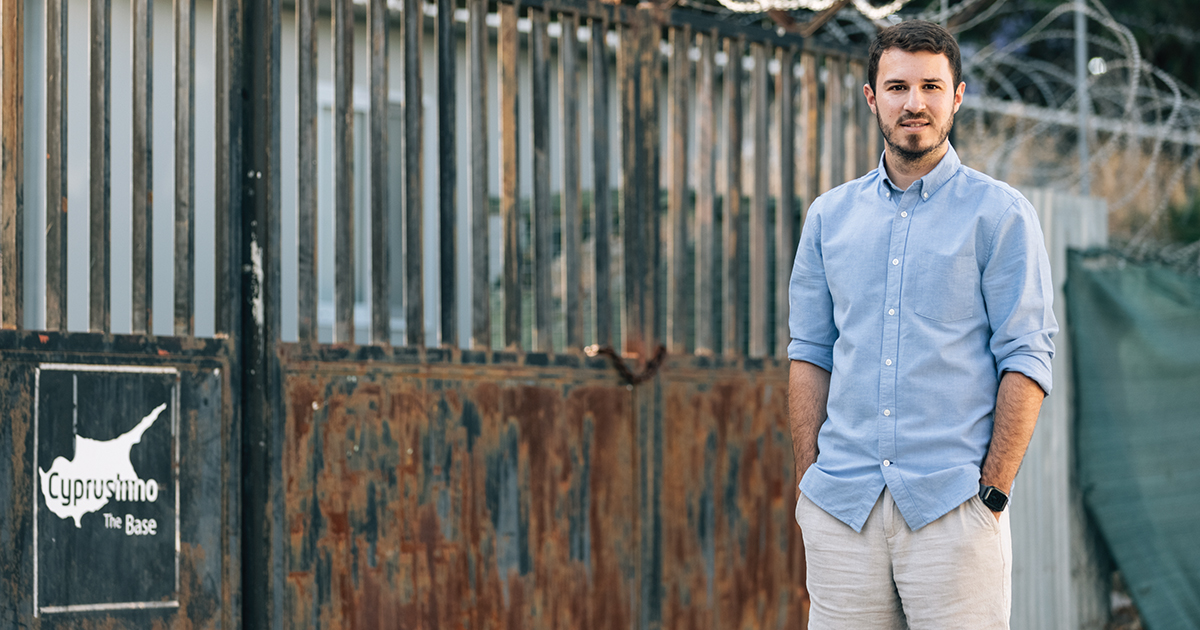
Steven Stavrou MBA’14 remembers the first networking event his organization put together. About 20 to 30 people showed up for what was hoped to be a friendly and casual event, but attendees simply stood around, clutching their drinks, not talking or interacting. It was awkward.
“We had no agenda in place. We weren’t sure what to expect,” Stavrou says. “People showed up and didn’t know what to do. They weren’t mingling.”
What made the event particularly challenging was its location: the Buffer Zone on the divided island of Cyprus. Located in the Mediterranean Sea, at the crossroads of three continents, Cyprus is a beautiful place, with beaches, mountains, and typically sunny days that have turned it into a popular tourist destination.
But, Cyprus also is an island literally split in two, between a Turkish Cypriot community in the north and a Greek Cypriot community in the south. That division has lasted decades, and after a failed Greek military coup and then subsequent Turkish military intervention in 1974, a physical, 112-mile-long demilitarized Buffer Zone was created between the two sides. Patrolled by United Nations peacekeeping forces and marked by barbed wire, that zone even cuts through the capital city of Nicosia, making it the last divided capital in Europe.
READ MORE: Why Entrepreneurial Leadership Matters
Turkish and Greek Cypriots rarely interact on the island. “It is a complicated place,” Stavrou says. “There is still far too often a their-side, our-side, mentality.” With strong family ties to Cyprus (his father was born there), Stavrou wanted to find a way to bridge the distance between the two divided communities.
That’s why he co-founded CyprusInno, an organization working to build community and trust on Cyprus through business and entrepreneurship. Launched in 2016, CyprusInno keeps a database of island startups, holds inclusive events and programs, and runs a collaboration and co-working space. Through CyprusInno’s efforts, a number of businesses on either side of the island now partner on initiatives. “We had this feeling that entrepreneurship would be a great peace-building mechanism,” Stavrou says. “Entrepreneurs value productivity and growth over any ideological difference.”
The work of peace is certainly not easy, but CyprusInno is bringing people closer together. At that first networking event, the Turkish and Greek Cypriots stood apart, not ready to cross the great divide that had been built up between their two communities. Eventually, the CyprusInno team invited attendees to get in a circle and introduce themselves. “The mood changed,” Stavrou says. “People were working on similar things on either side and realized they could collaborate.”
The Challenge: Improving Recycling
Babson College graduates such as Stavrou are problem solvers, and they are unafraid of taking on some of the complex challenges that the world faces today. As entrepreneurial leaders, they are well-equipped to help solve these intractable issues, thanks to the relationships they foster and their ability to navigate complexity and uncertainty.
Stavrou trying to bring peace to a divided island is one example of entrepreneurial leadership in action. Babson has helped produce many others. Consider Ravish Majithia MBA’18 and his efforts to change the recycling process and thus address the vast waste and damaging environmental impact of plastic.
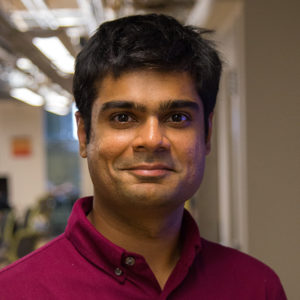
Majithia is the co-founder and CEO of Magnomer, a Framingham, Massachusetts, company that has its sights set on the ubiquitous plastic bottle. According to Magnomer, only 6% of plastic bottles are actually recycled into more plastic bottles. The rest either end up in a landfill, or, if they do find their way to a recycling facility, are so contaminated that they are recycled into a lower quality plastic, suitable for building materials but not plastic bottles again.
For every used plastic bottle not finding another life filled with juice or soda once more, that means a new plastic bottle has to be created from scratch. “We don’t want to keep making new plastic,” says Majithia, who has a PhD in materials science and engineering and is an experienced researcher. “That is a big goal, but that is where we want to be.”
A big reason recycled plastic can become contaminated, Majithia says, is the labels on bottles, which can’t be easily removed during the recycling process. “Why can’t we design packaging to be more sortable? I really thought this was a big opportunity,” Majithia says. “To have bottle-to-bottle recycling, getting rid of labels is essential.”
To address this problem, Magnomer created a transparent magnetic ink that can be added to labels of plastic bottles. Then, when those bottles are cut up for recycling at a facility, magnetic separators, already commonly in use, can sort those labels out of the plastic. This allows for better grade plastic to be recycled.
“We don’t want to keep making new plastic.”
Ravish Majithia MBA’18, Magnomer
Majithia admits to being a bit naïve when he started Magnomer. Its ink seemed like a strong idea for an industry seeking to be more sustainable, and so he leaped into launching a business even if he didn’t quite understand how complex a challenge he was up against. “I thought this would be easy,” he says. “Why wouldn’t someone want to do this?”
In order for the inks to be widely adopted, though, Magnomer has to work with two distinct constituencies: beverage companies and recycling facilities. Additionally, while beverage companies were open to trying Magnomer’s magnetic inks, they didn’t want to have to change any of their own designs or packaging. That’s why Magnomer spent 18 months in research and development to make sure its ink is transparent, allowing the inks to be added to labels without any design changes.
Several companies, including PepsiCo, are now testing out the magnetic ink, and recycling plants are checking out how well the ink helps with sorting. “We are not asking brands to change the way they do business,” Majithia says. “That is arguably our biggest value proposition.”
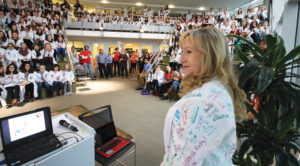
The Challenge: Bringing Equality to Science
Taking on complex issues often involves relying on communities and relationships for help.
Tapping into the power of relationships to mentor and inspire people is a big part of what Melissa Rancourt MBA’01 does with Greenlight for Girls. She is the board president and founder of the Brussels-based organization, which seeks to encourage girls to take courses and pursue careers in the STEM fields (science, technology, engineering, and math).
Too often, Rancourt says, girls steer away from these male-dominated fields, feeling a subtle push from a host of sources—peers, teachers, media, employers, and society at large—that math and science aren’t meant for them. That perception is so pervasive that it can be hard to counteract. “They don’t see others like themselves in those fields,” says Rancourt, a serial entrepreneur who owns her own engineering firm. “They don’t feel included. It’s about that feeling of belonging.”

Just like boys, girls deserve to pursue the opportunities that STEM provides, and those fields need them and their perspectives. “We need a variety and diversity of thought and approaches,” Rancourt says. Besides, considering how essential STEM is to so many industries, the more people who pursue these fields the better. “We are depending more and more on these vocations that require these skill sets,” Rancourt says. “I believe these subjects are the keys to making anything possible. In order to solve all the challenges around us, we need more people in these fields.”
Greenlight for Girls holds a variety of events, both virtual and in-person. “We are showing these subjects in fun, exciting, hands-on ways,” Rancourt says. “We are inspiring curiosity and learning.” The organization’s largest event might have as many as 200 to 300 girls attending. All are given lab coats, which they personalize with inspirational messages and learnings, and they participate in a day of workshops and design challenges.
“We are inspiring curiosity and learning.”
Melissa Rancourt MBA’01, Greenlight for Girls
Such an event may have some 100 volunteer role models on hand. Working for big companies and NGOs, schools and museums, the volunteers come from a range of backgrounds and share their stories with the girls. “One person having a conversation with someone might inspire them to go into the field,” Rancourt says.
Since its founding in 2009, Greenlight for Girls has worked with 8,500 volunteers and held events in 34 countries, reaching some 58,000 children. “There is a pressing need to do this, whether we are talking about Silicon Valley or a rural community across the globe,” Rancourt says. The organization also offers online tools and a fellowship program providing mentorship and college tuition assistance to girls in need.
In whatever country an event is held, the organization always closes it by having everyone in attendance say in their local language: “Anything is possible.”
The Challenge: Increasing Financial Literacy
Nitiya Walker ’14 understands the power of community. Growing up, she was raised in Clinton Hill and Bedford-Stuyvesant, two neighborhoods with large Black communities in Brooklyn, New York.
She relished the spirit of those neighborhoods, of how people tried to look after each other. The mantra “lift as we climb, and leave no one behind” described the responsibility that people felt toward one another, she says.
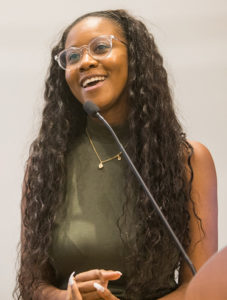
After graduating from Babson, Walker returned to Brooklyn and today once again lives in Bedford-Stuyvesant. “It made sense to come back home,” she says, and Walker continues to carry that community spirit, of neighbors taking care of neighbors, forward with her.
Walker is the founder and executive director of Seeds of Fortune, a nonprofit that teaches young women of color financial literacy and helps them to apply for college scholarships. She launched Seeds of Fortune her senior year at Babson, and since then, participants have been offered more than $15 million in scholarships and grants.
Walker strives to empower others through financial knowledge, which can have a wide-ranging impact. “For minority families, financial education is essential for their financial security,” she says.
At Babson, Walker saw how financial knowledge was commonplace among her classmates. Students are living and breathing business in their courses, of course, but many also are growing up in families who are financially astute. They know about investing, building credit, buying homes, and paying for college. “I saw how information was passed from one generation to another generation,” she says.
For people of color, however, Walker has seen how this knowledge is not always widely known. They may want to build better credit or buy a home, she says, but they may not understand how to get there. That lack of knowledge can hamper their future opportunities, especially considering the systemic racism they already face. “How can we have an equitable future when there is such a gap in financial knowledge?” Walker says. “It can help level the playing field to know how to manage your money.”
“It can help level the playing field to know how to manage your money.”
Nitiya Walker ’14, Seeds of Fortune
In its 10-month program, Seeds of Fortune takes girls through the college application and financial aid process. Thanks to a partnership with Yale Women in Economics, they also receive mentorship from Yale undergraduates while completing projects focused on economics.
In additional offerings, Seeds of Fortune provides online resources about college affordability, as well as an initiative focusing on the professional and financial development of college students.
By helping to financially empower young people, Walker has a front-row seat as they grow, guiding them as they enter college, find jobs, and start out on their lives. “It’s pretty gratifying,” Walker says. “The girls are taking ownership of their own future.”
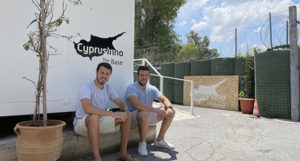
The Challenge: Building Peace
Back on Cyprus, Steven Stavrou hopes to use business relationships to build trust on the island. “Business relationships are heavily based on trust,” he says. “If we can build trust through business, that can build trust in our underlying communities.”
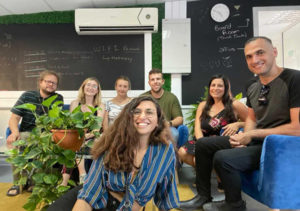
While the ultimate goal is to help forge peace on Cyprus, CyprusInno doesn’t force that message into its programming. The organization offers initiatives with the aim of bringing people together as a first step, in the hope that goodwill and collaborations follow. They often do. Business people from both sides of the island have teamed up to sell a variety of products, from olive oil to whiskey to tour packages.
“We don’t force the peace angle on anyone,” Stavrou says. “Our numbers opened up when we didn’t emphasize peace building. The peace building happens naturally. Collaborations happen naturally.”
A strong example of collaboration on the island is CyprusInno itself. Stavrou co-founded the organization with a Turkish Cypriot named Burak Doluay. They first connected online, and Stavrou admits that Doluay was the first Turkish Cypriot he had ever met. The pair now hope to provide a model for other divided places, and they recently met with others doing peace building work in Israel and Palestine. Stavrou also is part of Obama Foundation Leaders Europe, a six-month program that seeks to inspire, empower, and connect emerging leaders from across Europe.
“It’s amazing what we can accomplish together.”
Steven Stavrou MBA’14, CyprusInno
On Cyprus, the physical manifestation of CyprusInno’s work is The Base, a co-working and innovation space located inside the island’s Buffer Zone. To walk around Cyprus’ capital is to be in a place divided by walls, sandbags, and barrels, where U.N. soldiers and trucks are a common sight and passing through checkpoints is the only way to go from one side to the other.
That sense of division lifts inside The Base, which buzzes with meetings and events and is open every day. “We are surrounded by barbed wire. Then you walk into an innovation space,” Stavrou says. “People’s faces change when they walk inside.”
To see Greek and Turkish Cypriots working together in The Base is to imagine what a united Cyrus could look like. “It’s amazing what we can accomplish together,” Stavrou says.
Posted in Community




